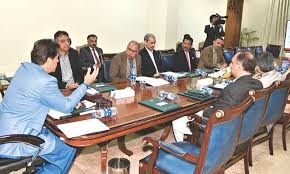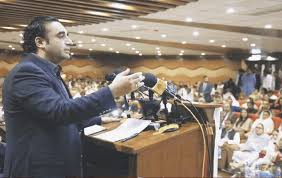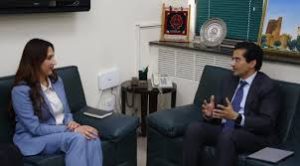Promotion of exports top priority: PM

Islamabad: Prime Minister Imran Khan on Thursday said that in view of the country’s economic improvement, the government’s foremost priority was the promotion of exports.
He was presiding over a high-level briefing meeting on the Strategic Trade Policy Framework (STPF) 2020-25 and the Textile Policy 2020-25.
The meeting was attended by Minister for Energy Umar Ayub, Minister for Economic Affairs Hammad Azhar, Advisor on Finance Dr Abdul Hafeez Sheikh, Advisor on Commerce Abdul Razak Dawood, Special Assistant for Petroleum Nadeem Babar, Governor State Bank of Pakistan Syed Raza Baqir, relevant federal secretaries and senior officers.
The Prime Minister while appreciating the efforts about the participation of private sector in policy formulation on institutional basis said the government believed in achieving economic targets with the guidance and consultation of private sector.
The present government was also committed to sustainability of policies, he added.
The Prime Minister directed to give special attention to the resolution of problems regarding the establishment of industries in the economic zones on priority basis and in line with the government’s policy.
Advisor on Commerce Abdul Razak Dawood briefed the Prime Minister in detail about the basic features of STPF 2020-25, guidelines, exports’ estimates, strategy for achieving targets and priorities regarding 26 different sectors along with comprehensive planning for their promotion.
Regarding STPF, the meeting was told that the comprehensive framework was aimed at bringing about change in the basic thinking about exports so that joint efforts for achieving export targets at national level could be ensured.
The meeting was further told that the basic purpose of this framework was to enhance the capacity of local industries so as to ensure the manufacturing of goods at domestic level in line with the requirement of international market.
Under this framework, basic principles were also being finalized so as to ensure the sustainability of policy for the next three to five years regarding exports, challenges relating to the manufacturing of goods, in particular the timely and easy payment of refunds to business community and implementation of the policies, it was told.
The meeting was told that under the proposed framework, a high-level committee under the chairmanship of the prime minister would be constituted to keep a check on the overall progress.
The Prime Minister was told that besides textile and leather products, surgical equipment, sports and carpet goods, rice and cutlery, 26 other non-conventional and development sectors like engineering goods, pharmaceutical, auto-parts, processed foods and beverages, foot-ware, gems and jewelry, chemicals, meat and poultry, fruit, vegetables, seafood, marble and granite etc. have been included in the framework and attention would be given for promoting the exports of these sectors.
The Prime Minister was also given a detailed briefing on the basic features and priorities of the proposed Textile Policy 2020-25.
He was told that the present government had provided Rs 71 billion to support the textile sector during the last one and half years alone as against Rs 68 billion provided during the last ten years period (2009-18).
The Prime Minister was further told that with the provision of Rs 27 billion to the textile sector during the last three months, an amount of Rs 1.2 billion had also been provided to the non-textile sector during this period.
The meeting was told that the previous governments had been making mere announcements to support the textile sector, but demonstrated negligence in the implementation, which caused financial hardships for businessmen.
The meeting decided to make the system of businessmen refunds further easy and that the problems faced by traders’ community would be addressed on priority basis.
It was decided in the meeting that the funds announced by the government to support various sectors would be made part of the budget so that payments in that regard could be made on time and without any hurdle.
The meeting, under the Strategic Trade Policy Framework, approved priorities and strategy regarding 26 sectors.





